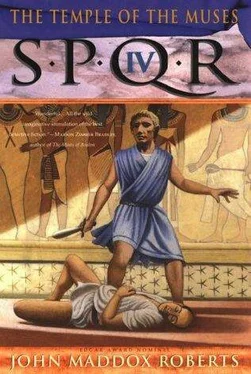John Roberts - Temple Of Muses
Здесь есть возможность читать онлайн «John Roberts - Temple Of Muses» весь текст электронной книги совершенно бесплатно (целиком полную версию без сокращений). В некоторых случаях можно слушать аудио, скачать через торрент в формате fb2 и присутствует краткое содержание. Жанр: Исторический детектив, на английском языке. Описание произведения, (предисловие) а так же отзывы посетителей доступны на портале библиотеки ЛибКат.
- Название:Temple Of Muses
- Автор:
- Жанр:
- Год:неизвестен
- ISBN:нет данных
- Рейтинг книги:5 / 5. Голосов: 1
-
Избранное:Добавить в избранное
- Отзывы:
-
Ваша оценка:
- 100
- 1
- 2
- 3
- 4
- 5
Temple Of Muses: краткое содержание, описание и аннотация
Предлагаем к чтению аннотацию, описание, краткое содержание или предисловие (зависит от того, что написал сам автор книги «Temple Of Muses»). Если вы не нашли необходимую информацию о книге — напишите в комментариях, мы постараемся отыскать её.
Temple Of Muses — читать онлайн бесплатно полную книгу (весь текст) целиком
Ниже представлен текст книги, разбитый по страницам. Система сохранения места последней прочитанной страницы, позволяет с удобством читать онлайн бесплатно книгу «Temple Of Muses», без необходимости каждый раз заново искать на чём Вы остановились. Поставьте закладку, и сможете в любой момент перейти на страницу, на которой закончили чтение.
Интервал:
Закладка:
"You said that Iphicrates was doing research into the properties of parabolic mirrors," I said. "Just what are the properties of these things, besides concentrating light?"
"They also concentrate heat," Asklepiodes said. "Come, I'll demonstrate." We went out into the courtyard and he squinted at the angle of the sun. With the reflector, he cast a disc of light against the side of the now-abandoned canal lock. Then he drew it back. As he did so, the disc shrank until it was an intensely bright spot the size of a copper as. "Put your hand there and you will see what I mean."
Gingerly, I slid my hand along the wooden surface until the tiny disc of light rested in my palm. It felt distinctly warm, but not hot enough to be distressing.
"To what use did Archimedes put these devices?" I asked.
"It is said that he set fire to Roman ships with them."
"Do you think that is possible? It doesn't seem to make all that much heat."
"These are miniatures. The ones Archimedes used would have been larger than shields. And he used a great many, perhaps a hundred of them lined up atop the harbor walls of Syracuse. With that many concentrating their light, I believe they might well have succeeded in firing attacking ships. Ships are extremely combustible at the best of times."
So for a while we experimented with the four silver bowls. With the light of all four concentrated on a single spot, we managed to coax some faint wisps of smoke from the wood. Back inside, I went over the inventory lists, trying to find anything that might offer a clue to just what the infuriating pedant had been up to.
"Item: a box of miscellaneous rope samples, each sample labeled," I read. "What do you think that means?" So we rooted around until we found the box beneath the table. It contained scores of pieces of rope, variously twisted and braided and of various materials, both animal and vegetable fibers being used. Each sample was about a foot long, and from each dangled a papyrus label adorned with shorthand lettering and strings of numerals.
Asklepiodes selected a handful. "These are made of human hair," he said. "What might be the use of such ropes?"
I studied the labels, trying to piece together their meaning. "Human hair is said to make the best rope for torsion-style catapults. The women of Carthage sacrificed their tresses to build war engines during the siege. Scipio conquered a city of bald-headed women. Look here: These abbreviations give the race and nation of each donor. The man was obsessive about detail."
"And the numbers?" For once, even Asklepiodes was at a loss.
I pondered them a while. "I think they measure the weight or tension at which the ropes finally broke. How he could determine such things I've no idea." If my guesses about his shorthand were correct, the hair of black Africans rated the lowest in this regard, while the hair of blond German women was the strongest and most resilient. None of the vegetable fibers or cords of animal hide were as good as hair. Even silk, while strong, had deficiencies in the torsion department because it was, if I translated correctly, "too stretchy." Besides, it was far too expensive.
I told Asklepiodes what the slave had said. "At least now we have a description of the killer, however sketchy."
"Medium-sized, dark hair and beard of Greek cut: that certainly narrows the field. Surely there can be no more than twenty or thirty thousand men of that description in Alexandria."
"And among them is General Achillas," I pointed out.
"A tenuous connection at best."
"It's enough for me," I maintained. "A man of that description is in Iphicrates's quarters on the evening of his murder. The next day, Achillas shows up without warning or reason and objects to my prying into the killing."
"Persuasive, but far from conclusive," Asklepiodes said.
"There's more. A few days ago, in a spirit of idle curiosity, I wandered into the parade ground of the Macedonian barracks. I noticed some sort of war engine under construction and went for a closer look. That lout Memnon ran me off, very rudely. I'll wager that, were we to go by the parade ground now, we would find that the engine has disappeared."
"If, as you seem to suspect, Iphicrates was designing engines of war for Achillas, why would he murder the man?"
"That has me puzzled," I admitted. "It could be because Achillas was approaching other kings with his designs. That could have violated some agreement the two had. I have learned that he accepted a large sum of money from Phraates of Parthia for certain designs."
"And yet," Asklepiodes said, "these activities of Achillas; are they illegal or understood to be some sort of provocation?"
"They could be so construed. Our foreign policy can be a complex matter. Once an allied king has accepted our help and protection, we assume leadership in military matters. That is our right as the greatest race of soldiers in the world. When we see such a king strengthening his defenses, we must assume that he is strengthening them against us since, with our aid, he has no one else to fear."
Asklepiodes made one of those throat-clearing sounds that denote skepticism. "It may be that, flying in the face of all reason, some kings are less confident in the security of Roman protection than are you."
"Oh, I'll admit that they sometimes suffer the odd mas-sacre or city sacking before the legions can come to their aid, but overall, the system is reliable. Sometimes, as a gesture of confidence, we have them demolish a part of the capital city's walls. That way, when they begin to rebuild them without informing us first, we know they are up to something. The agreement with Egypt is not that formal, but this sudden interest in improved armaments is most suspicious."
"Are there no other enemies who might justify such preparations?"
"Now that old Mithridates is dead and Tigranes has had his teeth pulled, there is no one. Parthia is too far away."
"An uprising by disaffected nobles, perhaps? I have heard rumors that some of the nomes are in arms and defying Alexandria."
"That's a job for infantry and cavalry," I said. "I've toured much of the land down to the first cataract. There are no fortifications to speak of. That part of Egypt is protected by the desert from foreign invasion. The only walled towns are up here in the delta area, and all of them are under Ptolemy's control."
"It seems, then, that you have good reasons for your suspicions. Now, what do you propose to do about them? Your superiors are not the sort of men to take hasty action."
"No, I have to gather more evidence. I have an utterly unjustified reputation as a troublemaker, and they'll look with skepticism on anything I bring them that isn't more concrete than what I already have."
"And how do you propose to assemble this information?"
"I think a bit of travel is called for."
I took my leave of Asklepiodes and went to the Library. The immense place was full of the dusty smell of books and the droning sound of scholars reading. Despite the size and massiveness of the building, the interior was not dim, abundant light being admitted by its extraordinarily large clerestory and numerous skylights of clearest glass. All the interior marble was white, to make best use of the admitted light. There were many statues of the various gods of learning: Apollo, Athena, ibis-headed Thoth and others, as well as busts of the great philosophers. The walls were lined up to the clerestory with lozenge-shaped cells holding scrolls like so many wine jars, each cell labeled with its contents.
By asking attendants, I was guided to the Wing of the Pergamese Books and found Eumenes of Eleusis overseeing the copying of some of his precious scrolls.
"May I help you, Senator?" he inquired politely.
"I hope that you may. The book that disappeared from the study of the late Iphicrates; you said it was by Biton, and entitled On Engines of War?"
Читать дальшеИнтервал:
Закладка:
Похожие книги на «Temple Of Muses»
Представляем Вашему вниманию похожие книги на «Temple Of Muses» списком для выбора. Мы отобрали схожую по названию и смыслу литературу в надежде предоставить читателям больше вариантов отыскать новые, интересные, ещё непрочитанные произведения.
Обсуждение, отзывы о книге «Temple Of Muses» и просто собственные мнения читателей. Оставьте ваши комментарии, напишите, что Вы думаете о произведении, его смысле или главных героях. Укажите что конкретно понравилось, а что нет, и почему Вы так считаете.









